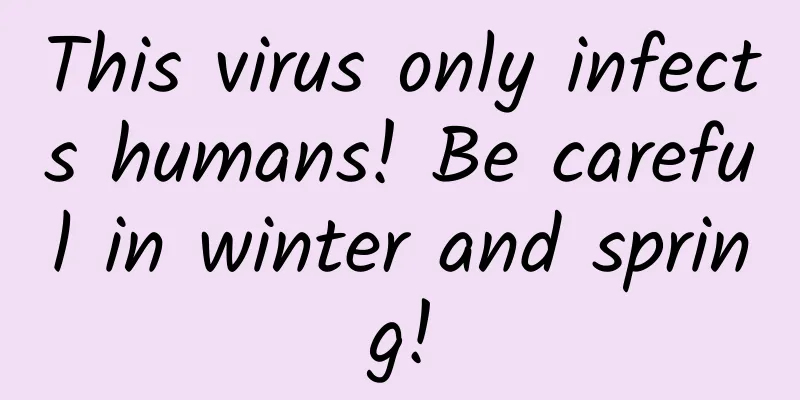This virus only infects humans! Be careful in winter and spring!

|
Author: Wen Jing (Shanghai Pasteur Institute, Chinese Academy of Sciences) The article comes from the Science Academy official account (ID: kexuedayuan) —— Did you have such a painful and happy experience when you were a child: you accidentally got chickenpox, the pain was unbearable itching, but the happiness was that you didn’t have to go to school and could be “isolated” at home for a long time. However, if you have never had chickenpox, you should be careful, because chickenpox is not exclusive to children! Although chickenpox is a benign infectious disease, it may induce complications such as encephalitis and pneumonia during the course of the disease, so it must not be underestimated. Winter and spring are the peak seasons for chickenpox. Let's listen to the hospital staff talk about how to fight "pox". Who is the culprit? Varicella is an acute infectious disease caused by primary infection with varicella-zoster virus (VZV). VZV is a double-stranded DNA virus and a member of the human alphaherpesvirus family. VZV and chickenpox on the skin of an infected person under a transmission electron microscope (Image source: pubmed) VZV can quietly invade the human body and cause two diseases, chickenpox and herpes zoster. Chickenpox is a common and highly contagious disease caused by primary viral infection. Children and adults who have not had chickenpox or have not been vaccinated against chickenpox are susceptible. Herpes zoster is caused by the activation of latent viruses and is common in the middle-aged and elderly and people with low immunity. Chickenpox is highly contagious (Image source: pp.pcbaby.com.cn) Varicella is highly contagious. According to statistical analysis, the infection rate of susceptible people who come into contact with patients with varicella is as high as 90%. Once a case is found in a susceptible population, it is easy for varicella to break out. Between 2005 and 2013, the highest incidence rate in China was 30.04/100,000, with the peak age of onset being between 3 and 10 years old. In addition, infants and young children have low immunity. If they come into contact with adults with herpes zoster, they are prone to varicella. Therefore, adults should be careful not to let patients with herpes zoster have close contact with children. Cunning attack method The incidence of chickenpox is higher in cool and dry seasons such as winter and spring. Humans are the only host and source of infection of VZV. The virus's favorite targets are T cells, skin cells and ganglia. The life cycle of the varicella-zoster virus (Image source: pubmed) The virus invades the body of a healthy person through droplets or blister plasma contact, first replicating in the mucosal epithelial cells of the infected site, and then spreading to the tonsils and other lymphoid tissues. It eventually enters the T cells and then follows them around. It can reach the skin, replicate in large quantities in the cells, damage the cells, and cause many small blisters on the surface of the skin, causing fever and unbearable itching; it can also travel to the sensory ganglion cells of the posterior roots of the spinal nerves and cranial nerves, hide quietly, and wait for a suitable opportunity (such as when the human body's immunity is low) to start replicating in large quantities, causing herpes zoster. The immune system strikes back Of course, humans will not sit idly by when facing VZV. Once the virus enters the human body, it cannot escape the recognition of the body's immune system. After the B cells in the body recognize some unique markers on the virus, they will synthesize a large number of antibodies against them. On the one hand, these antibodies can block the ability of the virus to enter cells; on the other hand, when the antibodies bind to the virus, they will recruit natural killer cells or macrophages with killing ability to kill the virus. In addition to antibodies, T cells are also good helpers in the immune system. When helper T cells detect the presence of viruses, they will secrete a large amount of interferon, cytokines and other molecules with killing effects to kill them. Another type of killer T cells can kill infected cells by identifying cells that have been infected by the virus and secreting granzymes or perforins, while eliminating the viruses in the cells. Most people will only get chickenpox once in their lifetime, after which they will have a strong immune resistance that can protect the body from getting chickenpox again. This is actually because the B cells in our immune system produce specific antibodies after they first recognize VZV. This type of B cells that can produce specific antibodies are on standby in the body at all times to detect whether there is VZV invasion. Once discovered, they will be quickly eliminated, thereby protecting the body from the secondary trouble of chickenpox. But it does not mean that you will never get chickenpox again if you have had it once. This also depends on the body's immunity. If the immunity is low, there is still a risk of being infected again. In this battle with the immune system, it is hard to say who will win, so it is very important to strengthen exercise, pay attention to a proper diet, and improve the body's immunity! Immune response to viruses Figure legend: Macrophage: Natural kill: Natural killer cell Neutrophil: Neutrophil Lymph node: Lymph node INNATE IMMUNITY: Innate immunity ADAPTIVE IMMUNITY: Adaptive immunity (Image source: pubmed) Vaccine + medicine to defeat chickenpox After years of hard work, humans now have a vaccine that can resist chickenpox attacks. The chickenpox vaccine is a live attenuated vaccine that retains the antigenicity of the virus while weakening its pathogenicity, so that after vaccination, it can induce the body's immune response and produce memory B cells and T cells, thus not only preventing the disease but also protecting the body from VZV infection for a long time. The first vaccine originated in 1974, when people isolated the virus from a little boy's blisters, attenuated it through passage, and finally obtained the oKa attenuated vaccine strain. The infection rate of people who have been vaccinated with the varicella vaccine is greatly reduced. Generally, children are given a dose of varicella vaccine when they are 12 months old, and a second dose when they are 4-6 years old. According to a survey conducted in the United States, the protection rate of one dose of the vaccine is 86%, and two doses of the vaccine can increase to 98.3% [4]. Vaccination (www.zcool.com.cn) If you have been infected with chickenpox, there is no need to be afraid, because there are now very effective medicines. Doctors usually use a combination of antiviral drugs (such as acyclovir, valacyclovir, ribavirin, etc.) and immunomodulatory drugs (such as cimetidine) to treat patients infected with VZV. You can also use calamine lotion externally to relieve itching. If you find that the herpes has broken, applying a little antibiotic ointment can prevent secondary infection. Vaccine + drug (Image source: Internet) In addition to relying on drug treatment, patients should also pay attention to a light diet, eat less spicy food, eat more fruits and vegetables, to supplement vitamins and speed up the body's recovery; during the illness, they should pay attention to cleanliness, change clothes frequently, ventilate more, and avoid scratching chickenpox, which will not only increase the chance of infection but also leave scars. In order to prevent infection to others, chickenpox patients should also be isolated until all the herpes are dry and scabbed, and the patient's clothes and utensils can be disinfected by boiling or sun exposure. With the advancement of medical technology, common diseases such as chickenpox can be effectively controlled by taking precautions and following doctor's advice. References: 1. Johnson, RW and RH Dworkin, Treatment of herpes zoster and postherpetic neuralgia. Bmj, 2003. 326(7392): p. 748-50. 2. Zerboni, L., et al., Molecular mechanisms of varicella zoster virus pathogenesis. Nat Rev Microbiol, 2014. 12(3): p. 197-210. 3. Mohn, KG and F. Zhou, Clinical Expectations for Better Influenza Virus Vaccines-Perspectives from the Young Investigators' Point of View. Vaccines (Basel), 2018. 6(2). 4. Wu Genpeng, Zhu Wei. Current status and research progress of varicella-zoster vaccine[J]. Chinese Journal of Biological Products, 2016, 29(03): 323-328+332. |
Recommend
Signs that a woman is cheating when she is sleeping, detailed explanation of the specific manifestations of a woman cheating!
Most women are more sensitive and emotional than ...
How can women with big belly lose weight?
Many office workers need to sit for long periods ...
How much blood does a woman bleed for the first time
Women need to have sexual life after they mature,...
Women's Day | May every "she" be beautiful and chic
Today is "International Women's Day"...
Don’t wait for the “wind” to come! The first batch of post-90s have become a high-risk group
With the development of social economy, The preva...
Will Yi Yang Qianxi marry someone outside the entertainment circle? What does Yi Yang Qianxi's wife look like now?
Yi Yang Qianxi can be said to be a very popular s...
Can I eat durian?
Menstruation is a normal physiological phenomenon...
How to quickly eliminate blisters in the mouth of pregnant women
You must always pay attention to your health duri...
Should I go to the gynecology department or obstetrics department for abortion?
Artificial abortion refers to the use of artifici...
What should I do if my belly is itchy during pregnancy?
Itchy belly after pregnancy is a symptom that man...
Pregnant woman with pain
Women will have many adverse conditions in their ...
How to use the Xiaolu suppository
What bothers women most is that there are always ...
How to check the cervix dilation
To check how many fingers the cervix is dilated...
Why did I suddenly stop having dysmenorrhea?
The sign of female maturity is menstruation. The ...
Can I still conceive naturally at 45?
With the opening up of the country's two-chil...
![[Popular Science] How to correctly prevent AIDS](/upload/images/67f1eaa227870.webp)








